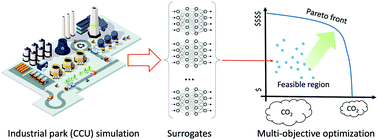Accelerating net zero from the perspective of optimizing a carbon capture and utilization system†
Abstract
Net zero requires an accelerated transition from fossil fuels to renewables. Carbon capture and utilization (CCU) can be an effective intermediate solution for the decarbonization of fossil fuels. However, many research works contain renewables in the design of CCU systems, which may mislead stakeholders regarding the hotspots of CCU systems. Herein, this work builds a CCU system with no renewables involved, and evaluates its greenhouse gas (GHG) emissions based on the life cycle assessment with a cradle-to-gate boundary. To pursue the best system performance, an optimization framework is established to digitalize and optimize the CCU system regarding GHG emissions reduction. The optimized CCU can reduce GHG emissions by 13% compared with the conventional process. Heating is identified as the most significant contributor to GHG emissions, accounting for 60%. Electrifying heating fully using low-carbon electricity can further reduce GHG emissions by 47%, but such extreme conditions will significantly sacrifice the economic benefit. By contrast, the multi-objective optimization can show how the decisions can affect the balance between GHG emissions and profit. Furthermore, this work discusses the dual effect of carbon pricing on the CCU system – raising the cost of raw materials and utilities, but also gaining credits when emissions are reduced in producing valued products.



 Please wait while we load your content...
Please wait while we load your content...